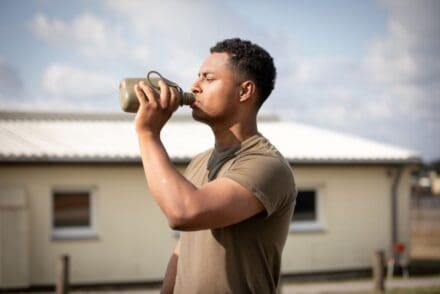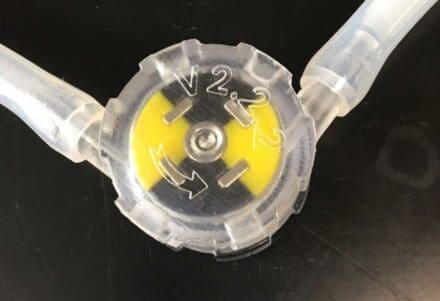NATICK, Mass. — Researchers at the U.S. Army Combat Capabilities Development Command Soldier Center, or DEVCOM SC, have invented a personal flow meter to measure water consumption. The invention, which has been licensed to an industry partner, will serve to help prevent dehydration in the nation’s warfighters. Preventing dehydration is important since it can impact Soldier health and performance. Monitoring and understanding hydration status of warfighters can help prevent heat exhaustion and heat stroke.
DEVCOM SC engineers Michael Wiederoder, Ph.D. (project lead), Eric Brack (project lead), Matt Hurley and Andrew Connors invented the device to specifically meet the needs of the nation’s Soldiers. Existing products didn’t provide the level of accuracy needed by warfighters, and some products require large batteries, which are impractical for Soldiers on the move.
“The flow meter is a handheld device with an inlet and outlet that connects to tubing that is currently used by Soldiers to drink from a hydration bladder they carry in their backpacks,” said Wiederoder. “Inside the device there is a water-wheel-like piece with fins that rotates as water passes through. There are magnets on the wheel that can either generate electricity or pass by a sensor that can correlate the volume of water consumed with the number of rotations by the wheel.”
Wiederoder explained that the flow meter tracks water consumption. The flow meter also helps Soldiers know when the filter needs to be changed, which is important because Soldiers often need to drink water that is available to them in their environment, making proper filtering essential.
“It can measure the amount of water that is consumed by an individual warfighter,” said Wiederoder. “It can also measure how much water is being added to the hydration bladder. The second part is relevant because the hydration bladder may contain a chemical filter that can only treat a certain volume of water. So, a flow meter can help warfighters understand when they need to change filters to ensure their water is safe to drink when they source it from the indigenous environment to reduce logistical burden.”
DEVCOM SC’s Bootstrap Initiative played a role in the development of the flow meter. The Bootstrap Initiative encourages innovation and provides employees the opportunity to come up with ingenious, cost-effective solutions to challenges facing the warfighter, while streamlining processes and minimizing bureaucracy. Through the Bootstrap program, DEVCOM SC’s civilian employees may submit proposals for a new technology, research project, business process, or administrative process that supports the Soldier Center’s science and technology mission.
Douglas Tamilio, director of DEVCOM SC, stated that the Bootstrap program is part of the organization’s dedication to finding cutting-edge solutions to best serve the warfighter.
“The innovative efforts of our world-class scientists and engineers enable us to work to overcome the challenges facing warfighters — all while optimizing their performance and increasing their lethality,” said Tamilio. “The development of a personal flow meter to measure water consumption, made possible by our Bootstrap program, is just one example of ongoing efforts to accelerate the process of getting the latest and best technologies into the hands of our warfighters.”
Wiederoder noted that the Bootstrap Initiative gave the team the boost their idea needed.
“The Bootstrap program allowed the team to turn an idea to solve a known problem into a physical device without waiting for the conventional proposal cycle,” said Wiederoder. “We had the right people, expertise, and equipment already at SC, we just needed Bootstrap funding to get started.”
The DEVCOM SC team used some of the Bootstrap funding to 3D print multiple iterations of two different flow meter designs and test their performance. The result is a compact, accurate device that can be manufactured with low-cost components, and since it is self-powered it can be used without the need for batteries.
The team then used test performance data generated to support filing of a patent application for the flow meter, with the patent being issued in 2022. DEVCOM SC signed a patent license agreement with HydroSmart, LLC, in early 2024. HydroSmart is an Ohio-based company that develops fluid consumption and hydration monitoring and management solutions for consumer, healthcare and military markets. DEVCOM SC’s patent license agreement with HydroSmart is an important next step in turning the prototype into something that is readily available to the warfighter.
“This partnership enables HydroSmart to leverage DEVCOM SC’s cutting-edge research and innovative patent to develop our emerging portfolio of products for monitoring and management of personal water consumption for the commercial sports and personal fitness markets,” said Matt Annen, HydroSmart’s chief executive officer. “Additionally, through ongoing collaboration with the Soldier Center’s expertise, HydroSmart is committed to developing an in-line solution for existing hydration bladders utilized by the Army. This collaboration supports our mission to deliver superior hydration monitoring systems which profoundly impact Soldier and citizen health and wellness. HydroSmart commercialization is also supported by the State of Ohio’s Technology Validation and Startup Fund, which has provided a grant to the company to prototype the commercial product.”
Wiederoder said that the patent license agreement will facilitate turning DEVCOM SC’s prototype into a “rugged, portable, food-safe device with integrated electronics.” He noted that the license will enable the technology to mature to the point “where it could be integrated into a user demonstration or field test to generate data needed for transition and potential acquisition by the Department of Defense.”
The technology also has potential to eventually benefit the general public, becoming a useful tool for athletes or anyone participating in physical activity. There is also the potential for other military and medical applications.
Wiederoder and the team are proud of the progression of their invention, and they are committed to serving the warfighter.
“It feels great to know that something you work on as a public servant could improve the lives of the warfighters,” said Wiederoder. “Especially preventing something as potentially tragic as dying from heat stroke due to dehydration. I think it’s really the dream of any researcher at the Soldier Center that the projects they put so much time and thought into end up helping the warfighters who sacrifice so much for our country.”
By Jane Benson, DEVCOM Soldier Center Public Affairs



